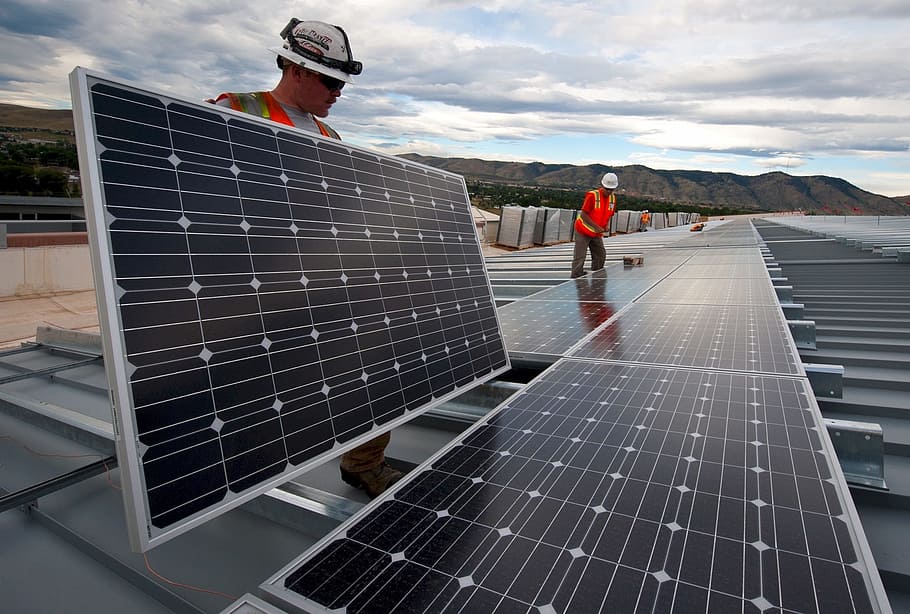
The majority of businesses are keen to Build Back Better in the UK, with many looking to solar as a sustainable solution to help get there.
This is according to solar developer and consultant Footprint Zero, who argue that while COVID-19 may have changed the market, there is certainly still an appetite for solar.
Solar Power Portal caught up with the company’s founding directors Rupert Harrow (RH) and Julian Pertwee (JP) about the solar opportunity in the UK, the challenges of the past year and what’s next for the company.
Could you tell me a little about Footprint Zero and what it is you do?
RH: If you look at what we believe is 250,000 hectares of south facing commercial roofs in the country, there's only 5% of that is devoted to solar. And if we converted 50% then that would provide 50% of the country's energy needs. In a benign favourable planning environment, there is a roof on every commercial building, which is an asset, and it's an asset that can drive revenue, drive cost savings, and add capital value to a property. So a huge benefit.
That’s why we're in this sector, and we focus on roofs. We won't turn you away if you ring me up and say, ‘oh, I've got a bit of ground mount space’ though. Julian was one of the founders of Hive, and they made their money and their name in the ground mount world, so we absolutely can deliver on that no problem at all.
We were born from Hive, we are solar developers who can bring that experience, which is coming from Julian and other members of his team from Hive, then the EPCs and the legals, all of that package that brings reassurance of 500+ megawatts of installation experience.
We create, craft and tailor a business plan, specific to what you are doing, so that you've got different business models to consider. So think of this almost as the architect, not just the builder. And then I think the last key piece in that jigsaw is funding.
JP: We've got our property professionals, as well, to help us get over the difficulties that some of the commercial businesses have with letting their roof or the airspace above their roof to solar. So our team is made up of property professionals and solar guys.
Most companies are really keen to do solar now, whereas a few years ago when I was at Hive, even when you were giving them free energy you struggled to get a conversation. Nowadays, the doors are open and people are prepared to listen, which is great.
What have the biggest challenges of COVID-19 been for solar developers like yourself?
RH: I suppose the trite answer would be getting chaps up ladders to put things on roofs, as we haven't been allowed to. But genuinely it's people's focus, we were talking to somebody who basically said to me, 'Guys, I need to talk to you, but right now I'm about to furlough 1,000 staff. I've just got to talk to you in a few months’ time'.
But March/April were tough, because everybody's attention was elsewhere, understandably. May/June, when we started to see a route out of this, it was a manageable situation and people's attention started to focus on us. We offer reduction in costs, and maybe a new revenue stream, which is very, very interesting particularly now.
Do you think COVID-19 will have a prolonged impact on power prices?
RH: Yeah, it's a supply and demand sort of conversation. Prices are always volatile, but we've just seen Wylfa nuclear power plant being cancelled. That was one of our great hopes for providing some energy into the country; that's now been removed, so what does that mean for solar? Does that actually mean renewables might be able to charge a bit more, because there's less of the nuclear available? Who knows? But it's an ever changing feast in pricing, that's for sure.
JP: What we try and do is set Power Purchase Agreements (PPAs) for a company, first of all to save them money but secondly, we can fix a rate of inflation for them to avoid the peaks and troughs of what's ahead. They seem to like the fact that if you set an inflation rate, and say it's going to be fixed for 25 years, especially if you're under what the energy price indexes are or have been.
Do you get the impression that most businesses are eager to sort of build back better then?
RH: 100%. If you and I were talking this time last year, I might have said to you, ‘I've got 25 shopping malls on my pipeline’ and I would have been quite excited about this, my financiers would have been quite excited about them, about big roofscapes. Now, of course, with the impact on the retail market, the risk profile of retail is changed. So, yes, people are looking to build out. But I think maybe the sectors that we're all focusing on might have just tweaked a bit maybe.
JP: Yeah, the other thing is I wonder is whether parents have been spending a lot of time at home with children; children are more aware of climate change and I think perhaps there's been some conversations around kitchen tables across the country that are changing people's perspectives.
Finally, what's next for Footprint Zero?
RH: We've got a huge pipeline, which we're going to close. Then the interesting thing is a lot of it is well over 100MWs of roof pipeline. A lot of those are pilot sites for people who've got a portfolio of 20 or 30 further properties.
So, rolling out those over the next year say, and then we've got a lot of south facing roofs in this country to get it covered in solar. So that's our objective, we're going to be the market leader in that.

